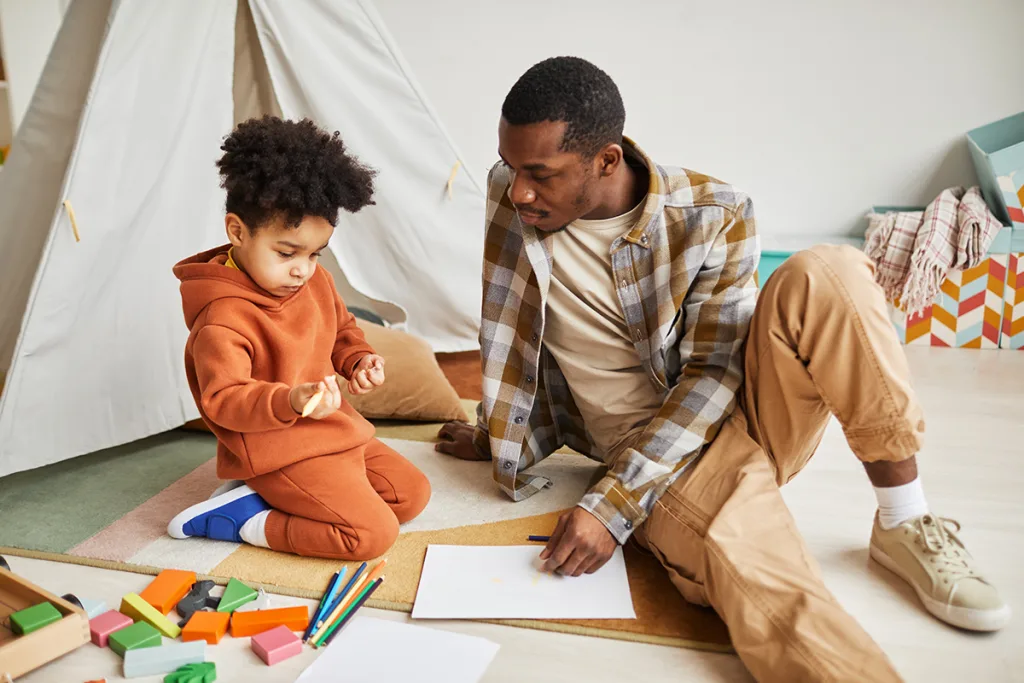Every parent looks forward to milestones like their child’s first smile, first word, and first steps. These moments aren’t just special—they serve as key indicators of your child’s development.
Child development milestones are a timeline for the physical, cognitive, social, and emotional skills children typically acquire as they grow. Understanding these milestones is essential for tracking progress, identifying potential developmental delays, and supporting your child’s overall growth.
While every child is unique and develops at their own pace, knowing these milestones helps parents stay proactive. By understanding what to expect at each stage, you can better nurture your child’s growth and consult healthcare providers if needed.
Let’s explore key child development milestones, what to look for, and how to support your child through each phase.
What Are Milestones in Child Development?
Developmental milestones are behaviors or physical skills seen in infants and children as they grow. They act as a developmental milestones checklist, allowing parents and pediatricians to monitor progress in five key areas:
- Gross Motor Skills: This involves large movements like crawling, walking, and jumping
- Fine Motor Skills: These involve smaller movements such as picking up objects, holding a spoon, or drawing
- Cognitive Development: This area involves thinking, problem-solving, and learning. It includes recognizing shapes, solving puzzles, and understanding cause and effect
- Language Development: This includes both understanding and expressing language, from babbling to full sentences
- Social-Emotional Development: This includes interacting with others, managing emotions, and developing self-awareness
Pediatricians use these milestones to track healthy development during routine check-ups. If a child is not reaching certain milestones, this may signal the need for early intervention, which can help address developmental delays before they become more pronounced.
Why Are Milestones Important in Child Development?
Developmental milestones play an important role in monitoring your child’s growth and well-being for several reasons:
- Tracking Progress: Milestones help parents and caregivers understand typical child development stages by age, allowing early identification of potential delays.
- Early Intervention: Recognizing delays early ensures that children receive the necessary support, such as speech or physical therapy, at the right time.
- Clear Framework: Milestones provide a structure for tracking your child’s growth, making it easier to discuss concerns with your pediatrician during routine visits.
Developmental milestones can also help parents understand the importance of early intervention. If delays are identified early, strategies such as speech therapy, physical therapy, or occupational therapy can be implemented to help children catch up. Early support can significantly enhance a child’s ability to meet future milestones and thrive both developmentally and socially.
It is essential to keep in mind that developmental milestones should be viewed as general guidelines. No two children develop exactly alike. Some may meet specific points on a child development milestones chart earlier than expected, while others may reach them a bit later. Milestones are a tool to help you understand what to expect and when to seek guidance if necessary.
Child Development Stages by Age
Understanding child development stages by age helps parents anticipate what’s next and how to support their child best during each stage. Below is a breakdown of the main stages of child development by age.
Milestones in Infants (0-12 months)
The first year of life is full of rapid growth and development. Tracking baby milestones month by month helps you monitor this exciting journey.
Physical Milestones:
- By three months: Your baby will begin lifting their head during tummy time, grasping objects, and smiling at familiar faces
- By six months: Your baby may start to roll over, sit with support, and reach for objects
- By nine months: Babies typically start to crawl, sit up without support, and pull themselves to stand
- By 12 months: Some babies may take their first steps, clap their hands, and say simple words like “mama” or “dada”

Cognitive Milestones:
Babies begin to understand cause and effect, such as realizing that shaking a toy produces noise.
They may start to explore objects by putting them in their mouths and passing toys from hand to hand.
Social Milestones:
Babies may start to smile spontaneously, engage in social play like peekaboo, and recognize familiar people from a distance.
What You Can Do to Encourage Development in Your Infant
Supporting your baby’s development in the first year is essential. Here are some ideas:
- Tummy Time: This helps babies build the muscles they need for future milestones like sitting up, crawling, and walking
- Talking and Singing: To help develop language skills, engage in conversations, sing songs, and narrate your day
- Sensory Play: Provide toys that stimulate touch, sound, and sight to encourage exploration and cognitive growth
- Reading Aloud: Reading books introduces your baby to language and helps develop early literacy skills
Supporting your baby’s development in these ways will lay the groundwork for their future learning and growth.
Toddler Development (1-3 years)
As toddlers grow, they gain independence and curiosity, showing major strides in mobility, language, and social skills.
Physical Milestones:
- By 18 months: Your toddler will likely be walking, helping with dressing, and beginning to run.
- By two years: They may start climbing stairs, kicking a ball, and drawing simple shapes.
Cognitive Milestones:
Your toddler will begin sorting shapes, identifying objects by name, and solving basic problems, such as how to stack blocks.
Language Milestones:
- By 18 months: Most toddlers can say several words and understand simple instructions.
- By two years: They start combining words into short phrases and sentences.
Social Milestones:
Toddlers will begin to show independence, display defiant behavior, and may experience separation anxiety when away from their parents.
What You Can Do to Encourage Development in Your Toddler
Encouraging your toddler’s development requires engagement and play:
- Interactive Games: Play games like puzzles or building blocks to improve problem-solving and motor skills
- Encourage Exploration: Provide a safe space where your toddler can explore freely. This boosts their confidence and independence.
- Language Expansion: Narrate your daily activities, introduce new words, and engage in conversations to help them develop language skills
- Physical Play: To strengthen their gross motor skills, they should participate in activities like running, climbing, and playing with balls
Supporting your toddler’s development will help them reach important milestones while building a strong bond between you and your child.

Preschool Development (3-5 years)
Preschoolers gain more independence and start developing advanced language and social skills.
Physical Milestones:
Preschoolers can hop, stand on one foot, and catch a ball with two hands.
Cognitive Milestones:
They will understand the concept of counting, identify colors, and start to understand the passage of time.
Language Milestones:
Preschoolers can speak in complete sentences, tell simple stories, and understand simple grammar rules.
Social Milestones:
They begin to make friends, take turns in group activities, and follow instructions more independently.
What You Can Do to Encourage Development in Your Preschooler
Here are some practical ways to support your child during this stage:
- Creative Play: Offer opportunities for art projects, pretend play, and role-playing to spark imagination and creativity
- Story Time: Read books together, ask questions about the story, and encourage your child to retell it in their own words
- Introduce Responsibility: Simple tasks like cleaning up toys or setting the table teach responsibility and self-reliance
- Encourage Group Play: Help your child learn social skills by organizing playdates or enrolling them in group activities like sports or music classes
By incorporating these activities into your child’s daily routine, you will promote their independence, creativity, and social abilities, preparing them for success in future academic and social environments.
What is a Red Flag in Child Development?
Developmental delays can be subtle or noticeable, but knowing the red flags to look out for can help you address concerns early. Some general red flags to watch for include:
- By six months: Not responding to sounds or showing interest in their surroundings
- By 12 months: Not babbling or responding to their name
- By two years: Not walking independently or not using simple two-word sentences
- By three years: Difficulty with basic instructions, not engaging in pretend play, or not making eye contact
If you notice any of these signs, consult your pediatrician. Early intervention can make a significant difference in your child’s development.
How to Support Child Development
Parents can create an enriching environment that fosters growth in all areas of development with these strategies:
- Engage in Daily Activities: Cooking, cleaning, and running errands can be educational experiences when you involve your child
- Read and Talk Regularly: Language development thrives in an environment where conversation is constant
- Limit Screen Time: Encourage active play instead of passive screen time, which is crucial for physical and cognitive development
- Model Positive Behavior: Children learn by imitation, so demonstrate empathy, patience, and curiosity in your daily life
By incorporating these principles into your daily routine, you can create a supportive and stimulating environment that encourages your child’s development and helps them reach their full potential.
When to Talk to a Pediatrician
If you are concerned about your child’s development, don’t hesitate to speak with your pediatrician. They can conduct screenings and provide referrals to specialists if needed. Trust your instincts as a parent and communicate openly with healthcare providers to ensure your child receives the support they need.

Get Help with an Au Pair
Balancing work, family, and supporting your child’s development can be challenging. A skilled au pair can provide personalized care that nurtures your child’s growth. Au pairs not only offer childcare but can help with daily activities that support and drive child development milestones.
Learn more about hosting an au pair and explore available candidates today by visiting our au pair search page.
Ready to get started? Sign up to become a host family today to begin your journey, or contact us with any questions about the process.
Frequently Asked Questions About Child Development Milestones
Developmental milestones are valuable tools for understanding your child’s growth, but it’s important to remember that they should be used as general guidelines.
Every child is unique, and their development may vary. Even still, it’s natural for parents to have concerns and questions about their child’s progress.
Below, we answer some common questions about child development milestones. Keep in mind that your child’s pediatrician will always be the best source of advice, as they know your child personally and can provide guidance tailored to their specific needs.
What are the 5 milestones of child development?
The five core milestones of child development cover different areas of growth:
- Gross Motor Skills: These involve large movements like crawling, walking, and running. They help children develop the strength and coordination needed for physical activities.
- Fine Motor Skills: These refer to smaller, more precise movements, such as grasping objects, drawing, and using utensils. These skills support tasks that require hand-eye coordination.
- Language Development: This includes both understanding and using language, from babbling and speaking to following instructions and using sentences
- Cognitive Development: This area involves thinking, problem-solving, and learning. It includes recognizing shapes, solving puzzles, and understanding cause and effect
- Social-Emotional Behavior: This milestone involves interacting with others, managing emotions, and developing relationships. It includes showing empathy, taking turns, and following social cues
Each of these milestones is essential for your child’s overall development, and progress in these areas helps ensure they are growing in a well-rounded manner.
Why should developmental milestones only be used as a general guideline for normal child development?
Milestones provide valuable insights into your child’s growth but always remember that each child develops at their own pace. For any specific concerns or questions, your pediatrician is your best resource to ensure your child is on the right track.
What age do children start talking?
Children typically begin saying their first words between 12 and 18 months. By 18 months, most children are able to say simple words like “mama” or “dada” and may begin to string together two-word phrases by age 2. However, speech development can vary significantly from child to child.
At what age should a child start walking?
Most children begin walking between 10 and 18 months. Some children may start walking earlier, while others take a bit longer, and both can be perfectly normal. Early walkers may begin as early as nine months, while late walkers might not take their first steps until 18 months or even later.



